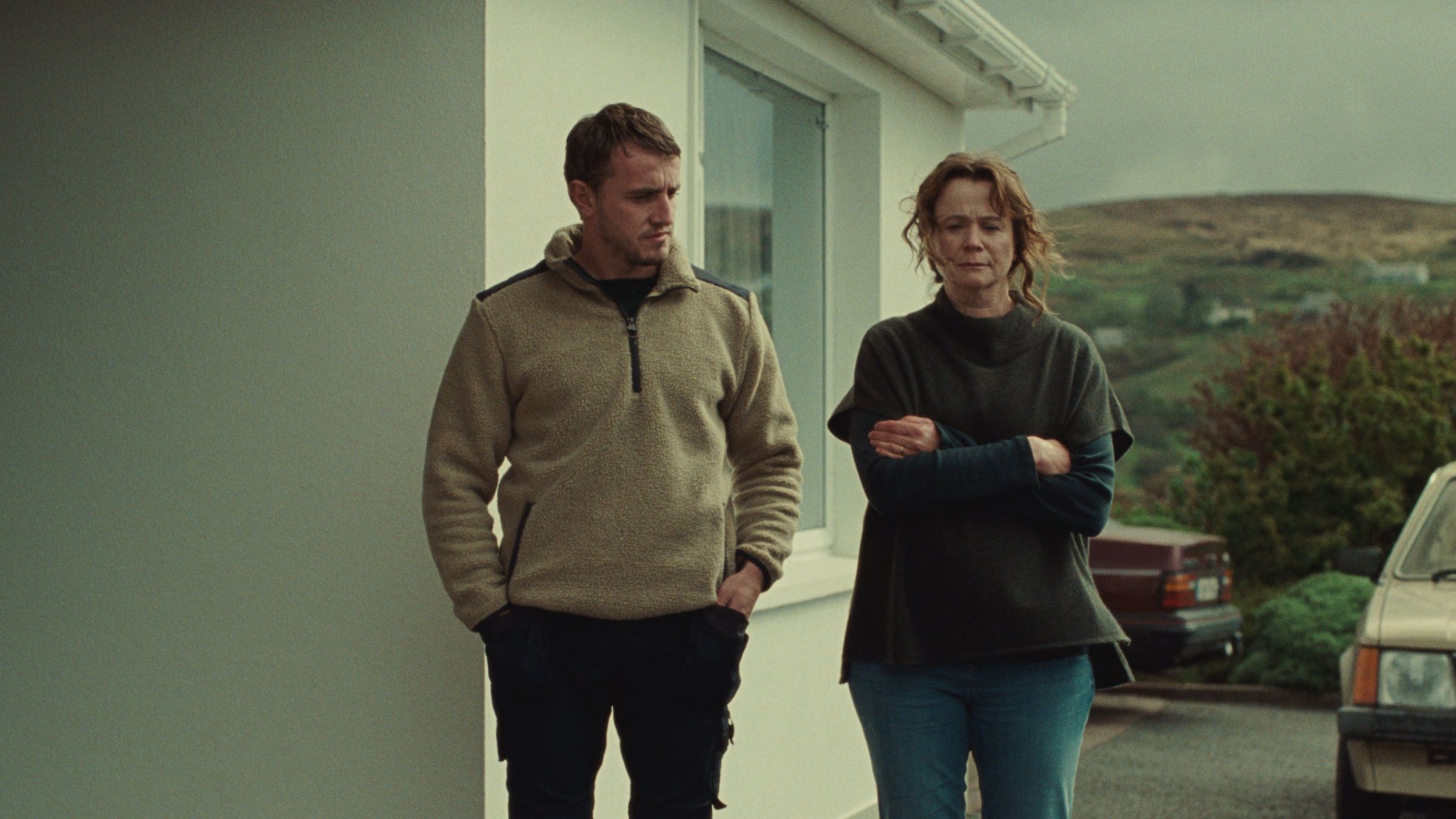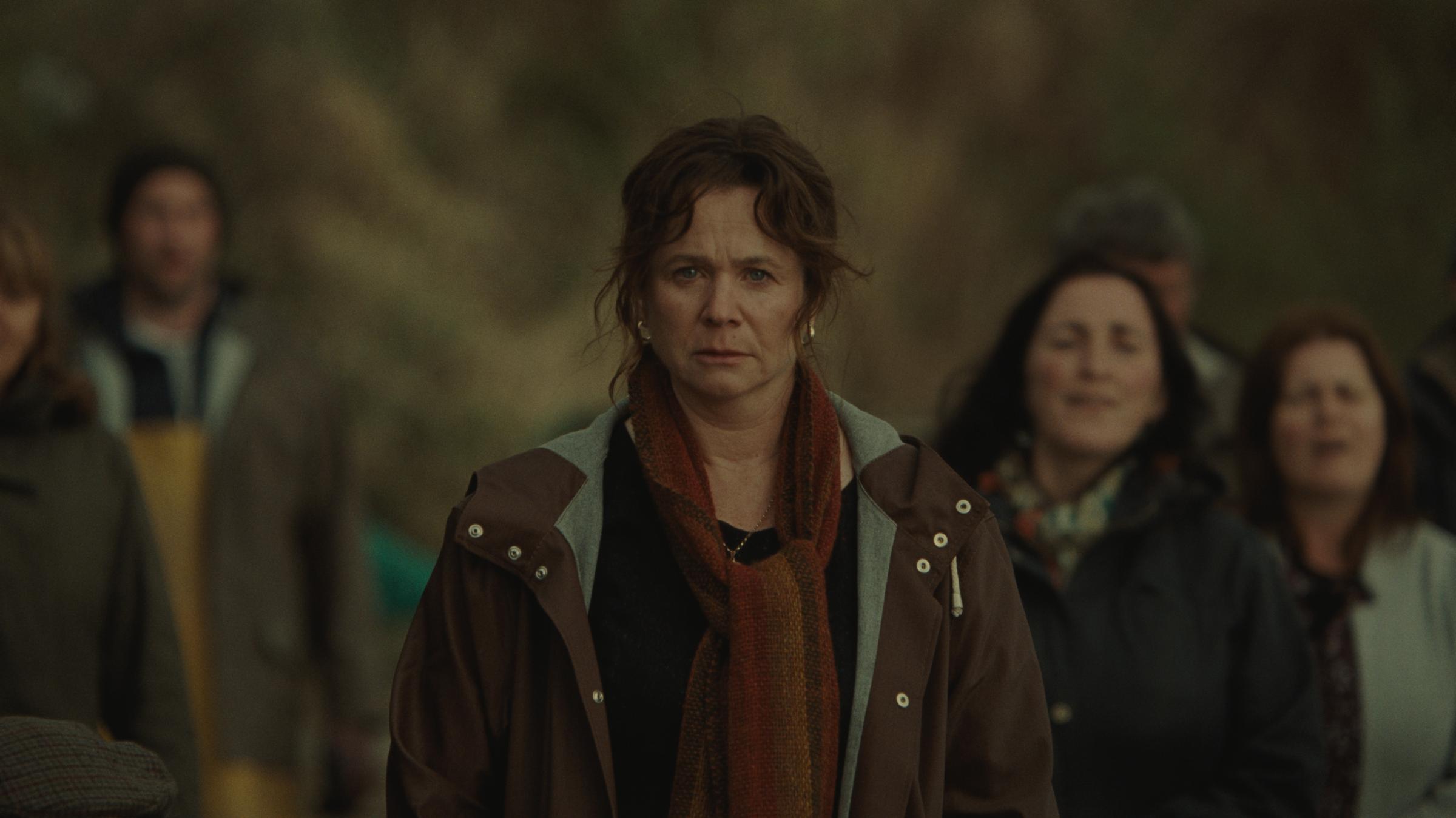
God’s Creatures is set in an Irish coastal town where the women stick together seemingly inseparably, all sharing the same hopes and values, unspoken or otherwise. A group of them work together in a fish-processing plant, stepping out for cigarette breaks where casual gossip can segue into conversations that plumb matters of life and death. Everyone goes to the pub together. Grandmothers look after their grandbabies so their daughters can go to work or enjoy a few hours of freedom. And when one woman loses a son, all the mothers mourn as if he were her own. But even in this close-knit sororal community, there’s always a man to drive a wedge into lifelong friendships, and those closest to him are the least likely to see it happening. The tragedy at the heart of God’s Creatures is that love can blind us to others’ pain.
Directed by two Americans, Anna Rose Holmer and Saela Davis, and produced by Fodhla Cronin O’Reilly—who grew up in a Kerry fishing village on the west coast of Ireland and wanted to tell a story that would capture some of the particulars of life there—God’s Creatures is both culturally specific and acutely universal. (The script was written by Shane Crowley, a childhood friend of Cronin O’Reilly’s who grew up in a neighboring town.) Emily Watson plays Aileen, a manager at the local fish plant who’s trustworthy both as a boss and as a friend—everyone seems to like and respect her. Her son, Brian (Paul Mescal), whom she hasn’t seen in years, shows up mysteriously one day—he’d decamped to Australia for reasons that are never quite explained, beyond some tension between him and his father, Con (Declan Conlon). But Brian, cheerful and affable, is now home to stay, determined to resuscitate the family’s dormant oyster-farming business. Con remains skeptical that Brian will follow through, but Aileen is delighted. She’s a woman with responsibilities and anxieties, but when Brian’s around, her face is a flower turning toward the sun. She can’t believe he’s come back to her.

But there are subtle, almost imperceptible, signals that Aileen may not be seeing Brian as others do. A local mother who has just lost her own fisherman son in a drowning accident—in this community, it’s considered bad luck to teach children to swim, because a man who knows how might drown while trying to save another—seems reluctant to give Aileen some of her son’s old clothes to pass along to Brian. At first, that moment reads simply as a grieving woman’s reticence about parting with her child’s possessions, though it later takes on some darker shades of possibility. And one of the youngest women in the group, Sarah (Aisling Franciosi), clearly has mixed feelings about Brian’s reappearance. There’s evidence that the two have had a romantic relationship in the past, though she makes it plain, one evening down at the pub, that she has no desire to rekindle whatever they had.
The drama in God’s Creatures builds slowly before taking a jagged hairpin turn. Brian is charged with sexual assault, which shocks—and yet doesn’t really shock—the community. The men close ranks around their own, while the women seem to support the accuser only privately. And Aileen can’t even countenance the possibility that her son might be guilty. As Mescal plays Brian, we see flashes of furtiveness, instances where his shuffling charm could actually be an insidious form of manipulation. But he seems to have made Aileen whole again, even though she hadn’t even acknowledged she’d been broken. Aileen also has a daughter, Erin (Toni O’Rourke), a young mother herself, though Aileen seems to gaze through her rather than see her. It’s almost as if Erin were an inconvenient conduit standing between Aileen and her beloved infant grandson.
Read More: The 52 Most Anticipated Movies of Fall 2022
God’s Creatures is a movie with a lot to say, about a culture that goes to great lengths to protect its men while expecting its women to maintain silence. More subtly, it explores the complicated nature of consent: human relationships have messy edges, and signals can get crossed—but those truths don’t automatically constitute a mantle of protection for an aggressor. Cronin O’Reilly and Crowley have been developing this story for more than a decade; they’re showing us a world they know firsthand. But the picture benefits from being filtered through the eyes of outsiders. This is Holmer’s second feature as director, following her bracing and imaginative coming-of-age picture The Fits. Davis, her codirector, was The Fits’ editor, and she and Holmer (along with a third writer, Lisa Kjerulff), conceived the story.
Holmer and Davis approach this world with both curiosity and compassion, but they also see what’s unforgiving about it. The movie, like the rocky coastal landscape in which it’s set, has a spiky, rugged texture. When we see the moon, it’s caught between the craggy black fingers of a tree. The score (by Danny Bensi and Saunder Jurriaans) features flute tones as tense as a cyclone and drums as wild as a nervous heartbeat. Gulls gather outside the fish plant, eager to peck at the bloody innards tossed their way. The wind that tousles Aileen’s hair is cold and grainy—we can tell just by looking. God’s Creatures is a story about women doing the best they can by one another in a place where the odds are stacked against them. It’s a chilly film but not a heartless one; sometimes the nature of forgiveness is captured best in a small sliver of light.
More Must-Reads from TIME
- Why Biden Dropped Out
- Ukraine’s Plan to Survive Trump
- The Rise of a New Kind of Parenting Guru
- The Chaos and Commotion of the RNC in Photos
- Why We All Have a Stake in Twisters’ Success
- 8 Eating Habits That Actually Improve Your Sleep
- Welcome to the Noah Lyles Olympics
- Get Our Paris Olympics Newsletter in Your Inbox
Contact us at letters@time.com